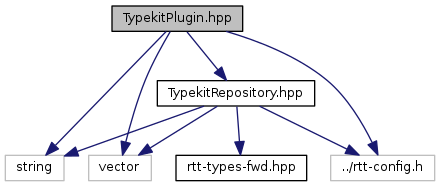Include dependency graph for TypekitPlugin.hpp:

This graph shows which files directly or indirectly include this file:

Go to the source code of this file.
Classes | |
| class | RTT::types::TypekitPlugin |
Namespaces | |
| RTT | |
| Contains TaskContext, Activity, OperationCaller, Operation, Property, InputPort, OutputPort, Attribute. | |
| RTT::types | |
Macros | |
| #define | ORO_TYPEKIT_PLUGIN(TYPEKIT) |
Macro Definition Documentation
| #define ORO_TYPEKIT_PLUGIN | ( | TYPEKIT | ) |
Value:
extern "C" { \
bool loadRTTPlugin(RTT::TaskContext* tc) { \
if (tc == 0) { \
RTT::types::TypekitRepository::Import( new TYPEKIT() ); \
return true; \
} \
return false; \
} \
RTT_EXPORT std::string getRTTPluginName(); \
std::string getRTTPluginName() { \
TYPEKIT tk; \
return tk.getName(); \
} \
RTT_EXPORT std::string getRTTTargetName(); \
std::string getRTTTargetName() { \
return OROCOS_TARGET_NAME; \
} \
}
static void Import(TypekitPlugin *tkp)
Definition: TypekitRepository.cpp:52
RTT_EXPORT std::string getRTTPluginName()
RTT_EXPORT bool loadRTTPlugin(RTT::TaskContext *t)
Definition: TaskContext.hpp:93
RTT_EXPORT std::string getRTTTargetName()
Contains TaskContext, Activity, OperationCaller, Operation, Property, InputPort, OutputPort, Attribute.
Definition: Activity.cpp:53
Once you defined your TypekitPlugin or TransportPlugin class, you can use this macro to make it available as a plugin.
- Note
- Do not use this macro inside a namespace ! For example: ORO_TYPEKIT_PLUGIN ( KDL::KDLTypekit ) where KDL::KDLTypekit is a classname, derived from RTT::types::TypekitPlugin or RTT::types::TransportPlugin
Definition at line 131 of file TypekitPlugin.hpp.